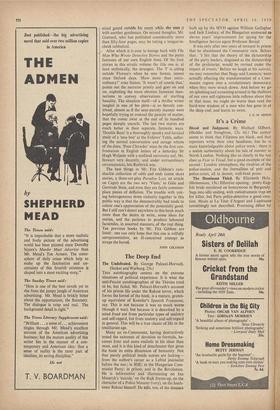The Deep End
The Undefeated. By George Paloczi-Horvath. (Seeker and Warburg, 25s.) This autobiography centres on the extreme situations of political experience. It is what the anti-Fascist autobiographies of the Thirties tried to be, but failed. Mr. Paloczi-Horvath's account of his prison life under the Rakosi terror, which forms the kernel of the book, is a mature, grown- up equivalent of Koestler's Spanish Testament, say. This is not because it was so much worse (though it was), but because it is described by a mind freed not from particular types of zealotry and self-regard, but from zealotry and self-regard in general. This will be a true classic of life in the totalitarian age.
Many an ex-Communist, having destructively tested the extremes of devotion to formula, be- comes freer and more realistic in his ideas than most, and it is this kind of detachment that gives the book its extra dimension of humanity. Not that purely political inside stories are lacking— from the author's career as a Leftist journalist before the war; in SOE; in the Hungarian Com- munist Party; in prison; and in the Revolution. He is informative and illuminating on Jan Masaryk's 'suicide,' on the Rajk frame-up, on the character of a Police Minister (very), on the loath- some Rakosi himself. He tells, too, of the dossiers built up by the MVD against William Gallagher and Jack Lindsay, of the Hungarian sentenced to eleven years' imprisonment for spying for the Intelligence Service agent Professor Bernal.
It was only after two years of torment in prison that he abandoned the Communist view. Before that : 'I felt that the theory of the dictatorship of the party leaders, disguised as the dictatorship of the proletariat, would be revised under the impact of events.' Before we laugh at his naivete, we may remember that Nagy and Losonczy were actually effecting the transformation of a Corn munist regime into a revolutionary democracy when they were struck down. And before we go on splashing and screaming around in the shallows of our own self-righteous little reflexes about this or that issue, we might do worse than read the hard-won wisdom of a man who has gone in at the deep end; and learnt to swim.
J. E. M. ARDEN














































 Previous page
Previous page